Finding Common Ground in a World of Faith

Throughout history, religion has played a profound role in shaping societies, offering comfort, purpose, and a sense of belonging. Yet, it has also been a source of division, with followers often staunchly believing their path is the only correct one. This dichotomy prompts us to explore how we can transcend religious labels and foster a more compassionate world.
Upbringing and Belief
Religious beliefs are often deeply influenced by upbringing, with studies indicating that children typically adopt the religion of their parents. While this fosters cultural continuity, it raises questions about the autonomy of personal exploration and independent thought in matters of faith.
A World of Diverse Beliefs
In our modern era, diversity of belief is increasingly evident. According to a 2018 Pew Research Center survey, 70% of the world identifies with a religious group, while a significant quarter identifies as religiously unaffiliated. This diversity underscores the richness and complexity of religious landscapes today.
Shared Values Beyond Labels
Despite doctrinal differences, many religions share fundamental values such as compassion, kindness, and service to others. Emphasizing these shared principles can bridge gaps and foster mutual understanding among people of various faiths, and those who identify as non-religious.
Living a Meaningful Life Here and Now
While religious beliefs often contemplate the afterlife, focusing exclusively on it can detract from living a meaningful life in the present. Regardless of religious affiliation, all individuals experience universal emotions like joy, sorrow, love, and loss. Recognizing and sharing these experiences with empathy can strengthen community bonds.
Religion: A Force for Good, with Cautions
Religion can be a positive force, promoting social cohesion and guiding ethical behavior. However, doctrines that foster exclusivity and division warrant careful consideration. Striking a balance between unity and diversity is essential for fostering a harmonious society.
Building Bridges, One Conversation at a Time
By prioritizing our shared humanity and core values, we can initiate meaningful dialogues that transcend religious boundaries. These conversations are crucial for promoting interfaith understanding and collaboration towards a more peaceful and compassionate world.
Let's Talk
Here are some thought-provoking questions to spark discussion:
- How has religion influenced your personal journey and life experiences?
- What steps can we take to enhance interfaith dialogue and mutual understanding?
- Which values do you believe are universally important, irrespective of religious affiliation?
Remember, these questions serve as a starting point for respectful and insightful conversations. While the answers may vary, engaging in dialogue allows us to move beyond labels, find common ground, and foster a more inclusive and empathetic global community.
Conclusion
In conclusion, the quest to move beyond religious labels requires embracing diversity while recognizing our shared humanity. By cultivating understanding, empathy, and dialogue, we can transcend divisions, promote cooperation, and collectively strive towards a world where compassion and respect prevail.
Comments (3)
Abenezer says:
Jul, 27 2024 06:17 PM
it's a very well written blog
Johnny says:
Jun, 02 2024 06:49 PM
While it is a great insight, it is difficult to put it into practice especially considering the current situations
Abenezer says:
Jun, 01 2024 11:03 AM
This is the best blog i read so far